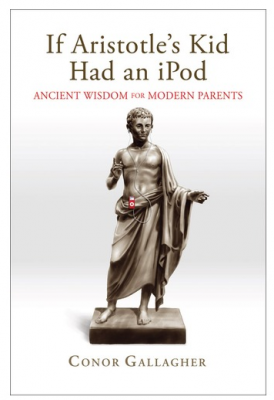 If Aristotle's Kid Had an iPod
If Aristotle's Kid Had an iPod
One doesn't need acute moral perception to realize that virtue, in our society today, is a lost art. To prove this point, I bet most of you reading this can't name the four cardinal virtues. Until recently, I couldn't either. However, every educated person in the ancient world, up to the beginning of the modern era, knew what these were; it was common knowledge.
What we are familiar with are the names of the vices: greed, pride, envy, lust, etc. Although, we are gradually losing the ability to identify them as such. This is because today those that possess and flaunt these vices are often admired; in a twisted way, they are regarded as the new virtues. Just think of Hollywood and sports icons, and you catch my drift.
So, if we don't know what the virtues are, and probably not even what virtue itself is, how can we practice being virtuous ourselves, much less teach virtue to our children?
We need to go back to basics and re-learn what was taken for granted for thousands of years. We have to go back to those who taught virtue the best and re-learn the wisdom they handed down. And there's a new book out now to help you Catholic Moms do just that in a simple and fun read. This book is called, If Aristotle's Kid Had an iPod: Ancient Wisdom for Modern Parents.
Why Aristotle?
Before I describe why the book is a great one to read, it's important to discuss the history behind it. Even among the pagans thousands of years ago, God was working with man's natural light of reason. While God was directly revealing Himself to the ancient Israelites, His Providence was indirectly guiding the ancient pagan Greek philosophers. He was sowing the intellectual seeds that would influence the dominating worldview into which the Incarnated Christ would be born. Without direct revelation from God the pagan philosophers got many things wrong . . . but they were also right about many things too. And what they got right would be a benefit for Christianity in the future.
After Pentecost, Christianity spread far and wide into the ancient world—which at the time was dominated by Greek language and culture. This eventually paved the way for the two greatest Christian theologians, St. Augustine and St. Thomas Aquinas, to use what was true in the ancient Greek philosophers and use it to better understand Christianity and defend it against heresy. These towering saints synthesized the peak of divine revelation (the Person of Jesus Christ) with the peak of man's natural reason (Socrates, Plato, and Aristotle) so that man could more fully understand God's revelation.
Why Virtue?
Now that this bit of history has been explained, what does all of this have to do with you? The answer is that virtue matters to everyone, old and young, parents and children, Christian and pagan. It is not the residue of a world long gone; it's a part of human nature. You should aim for virtue in your own life and teach your children to develop virtue as well.
You may still be asking, Why? Because it is your duty to do so? Or because things just work better that way?
While there may be some truth in these two responses, Aristotle taught that you should be virtuous, or at least strive to be so, for it's own sake. Virtue is a good that is its own reward. And the best teacher of virtue was the pagan Greek philosopher Aristotle. He was so good, in fact, that St. Thomas Aquinas (the foremost Doctor of the Catholic Church), simply called him “The Philosopher”.
You probably don't have time to sit down and read Aristotle's books, pulling out all the best principles to help you understand your kids and raise them well. The good news is that the book, If Aristotle's Kid Had an iPod: Ancient Wisdom for Modern Parents has done that for you. It's like a cliff notes version of Aristotle.
About the Book
 This helpful book on parenting ancient-wisdom-style tells you only the amount of Aristotle you need to know to benefit your children the most as they’re growing up. And the author, Conor Gallagher, is a devout Catholic who studied philosophy at the Catholic University of America and has been practicing the wisdom of Aristotle with his eight kids.
This helpful book on parenting ancient-wisdom-style tells you only the amount of Aristotle you need to know to benefit your children the most as they’re growing up. And the author, Conor Gallagher, is a devout Catholic who studied philosophy at the Catholic University of America and has been practicing the wisdom of Aristotle with his eight kids.
Conor rightly points out a truth that is often neglected, that kids—his kids, your kids—need more than just love. Aristotle taught that it is crucial for children to also have a good upbringing for them to live a happy, well-balanced life. This book takes Aristotle’s thought and breaks it up into three sections, finding virtue, finding friendship, and finding happiness. These qualities are key to a life well-lived using the brains God gave us.
Part I: Virtue
In this section Conor explains that to be a successful parent you need to understand how your children tick, and in order to do that, you need to know what kind of creatures they are. This is not unlike how The Dog Whisperer deals with dogs and their owners. He simply reminds dog owners that their dogs are not people, and when they treat their dogs like they're people all kinds of behavioral problems emerge with their canine companions. Same with kids. Conor explains that humans have rational souls in physical bodies which enable them to develop virtue and character. Just like all things, morality comes on a scale and your child can advance on it. They can move from a weak-willed child who struggles to be good, to a strong-will child who struggles to be bad, to the virtuous man or woman who regularly does good. If this sounds too abstract, don’t worry, Conor uses fictional and non-fictional characters to illustrate just what he means.
Part II: Friendship
In part two, Conor explains an important part of Aristotle's thought—the definition and characteristics of true friendship. Conor explains that there are many relationships that masquerade as friendships, but really aren't friendships in the true sense. To make a good friend and to receive the benefits of genuine friendship, one must necessary be virtuous. St. Thomas Aquinas built on Aristotle's thought to help us understand that the ultimate friendship is found with God. It's in this chapter that Conor gets into what Aristotle would say about your kids, friendships, and modern technology—iPods, internet, Facebook, and the like. How would Aristotle advise his son to develop personal virtue and genuine relationships in this kind of plugged-in society?
Part III: Happiness
In part three Conor deals with perhaps the hallmark of Aristotle’s work: happiness. It’s not an emotion or a feeling, it’s a state of being. We already know something about this from our Declaration of Independence. The “pursuit of happiness” that our Founding Fathers wrote about originates with the thought of Aristotle. Conor explains, again through using familiar characters as examples, that the development of virtue is the fertile soil in which happiness flourishes. He explains what the four cardinal virtues are (prudence, justice, courage, and temperance), how to find the virtuous choice in life's puzzling circumstances, and how to teach your kids how to recognize them as well. He then finishes out the book by talking about your child's ultimate source of happiness—God. And when your child has developed virtue, and understands genuine friendship, and knows what it’s like to pursue what is good, he will be better equipped to have true friendship with God and enjoy Him as his ultimate good.
Then it all comes together: this is how God worked through the wisdom of ancient pagans to help us understand better His revealed truth . . . so we can be better friends with Him. This is why Aristotle matters to your kids, and why you need to read this book!
If Aristotle's Kid Had an iPod: Ancient Wisdom for Modern Parents is written in a light-hearted, accessible way so you don't have to be intimidated by reading Aristotle in the raw. Pick it up, kick back, and enjoy! Then take the treasures you learn and pass on this ancient wisdom to your modern kids.
Copyright 2012 Gretchen Filz
About the Author

Guest
We welcome guest contributors who graciously volunteer their writing for our readers. Please support our guest writers by visiting their sites, purchasing their work, and leaving comments to thank them for sharing their gifts here on CatholicMom.com. To inquire about serving as a guest contributor, contact editor@CatholicMom.com.


.png?width=1806&height=731&name=CatholicMom_hcfm_logo1_pos_871c_2728c%20(002).png)
Comments